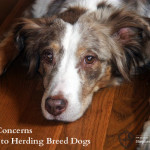Poison Pills: One Drug is Putting Herding Dogs at Risk
Owners of herding dogs, especially collie type breeds, learned early they must be extra cautious about providing their dogs certain drugs, though it wasn’t until 2001 that the reason why was made clear: a mutation in the dog’s genes made them vulnerable for dying from drug toxicity. Awareness of potential negative drug interactions has since increased and become more important to everyone as research uncovers the complexity.
A presentation given in 2011 by Niall Taylor BVM&S, MRCVS GPCert(SAM), Orchard Veterinary Group, Glastonbury, Somerset titled, The MDR1 gene, its story and its significance in collies (1), described how ivermectin (avermectin) was first made available commercially in 1981. The commercial product was labeled Ivomec and was used by veterinarians to treat parasites in livestock. Vets soon saw it was also effective in treating sarcoptic and demodectic mange in dogs, but it wasn’t used long before they began to see toxicity problems in Collies.
Vets became cautious about using the drug in Collies, though they didn’t understand what was happening.
Then in 2001, Katrina Mealey, D.V.M., Ph.D., a pharmacologist and internal medicine specialist at Washington State University's College of Veterinary Medicine in Pullman, Washington, made the connection between earlier mouse research and the deaths in Collies exposed to some drugs, to identifying a mutation in a gene that works to pump drugs from the brain--MDR1.
A correct functioning multi-drug resistance gene (MDR1) is responsible for encoding a transmembrane protein called P-glycoprotein that protects the brain as it transports medical drugs into the dog’s body. These pumps are found throughout the body and push toxins forward and out of the body. MDR1 is part of the blood brain barrier complex and dogs with a mutation in the gene cannot move the drug from the brain. Instead, these drugs build-up in the dog’s brain until they reach toxic levels and trigger reactions that can include death.
Dr. Mealey published her breakthrough findings, Ivermectin sensitivity in collies is associated with a deletion mutation of the mdr1 gene (2) and research began to advance faster. Soon Dr. Mealey had a reliable genetic test for the mutation in MDR1.
Dr. Taylor explained in his presentation that the MDR1 gene defect is inherited as a recessive gene but with partial expression. So a dog with two copies of MDR1 has the correct number of membrane pumps and will be normal. A dog with two copies of mdr1 (the mutation) will have non-functional pumps and have marked problems with drug sensitivity. But if a dog has one of each gene, (MDR1 + mdr1, a carrier) the normal MDR1 gene, though dominant, is incompletely expressed and the dog will have drug sensitivity but less so than the completely affected dogs. (3)
Genetic screenings for this mutation from dogs throughout the world, have identified that the mutation is present in 70% of all Collies. Genome mapping has tracked the gene from likely a single individual dog in England in the 1800’s, to other herding breeds and cross bred dogs. Breeds like German Shepherd Dogs, Old English Sheepdogs can carry the gene mutation and Long-haired Whippets have nearly the same affected rate as Collies, with 65 percent of those tested carrying the MDR1 mutation.
Collie breeder, Vickie VonSeggern, Thorndale Kennel in Wisconsin, recommends people work with their veterinarians to assure the safest treatments for their Collies.
“I discovered that many vets either did not know about the MDR1 at all, or they followed the drug manufacturer’s advice which is that the amount is low enough in products like heart worm preventatives, that it will not affect MDR1 dogs at all,” Vickie said. “We have seen cases where this is not always true.”
But the medicines given to the dogs isn’t the only risk - dogs are put at risk by other animals who have been treated with ivermectin. Why? Dogs eat poop. They eat each other’s, they eat their own, and they eat poop from other animals.
“People also have to watch when they worm livestock,” Vickie added. “Ivermectin is a commonly used cheap, livestock wormer but it stays in the environment carried in the stool a long time. I have known of collies who died from eating stool containing ivermectin as a wormer for the livestock.”
The multi-drug sensitivity is not limited to avermectins but include a range of drugs commonly used in veterinary medicine. A list of these drugs is available on the WSU Clinical Pharmacology Laboratory website and are a reference starting point.
The safest strategy for owners is to screen for the MDR1 mutation. Genetic testing is available from Clinical Pharmacology Laboratory at Washington State University, which you can contact at http://www.vcpl.vetmed.wsu.edu or by phone 509-335-3745 for submission details.
Article By:
Bobbie Kolehouse
Member of the Dog Writers Association of America,
Member of The American Spaniel Club (and Co-Chair of the Archival Committee)
References:
1. Niall Taylor BVM&S, MRCVS GPCert(SAM). 2011. “The MDR1 gene, its story and its significance in collies” (Presentation transcript)
2. 7) Mealey, K.L., Bentjen, S.A., Gay, J.M., Cantor, G.H., (2001) Ivermectin sensitivity in collies is associated with a deletion mutation of the mdr1 gene Pharmacogenetics Vol.11 No. 8 pp. 727-33 (http://www.ncbi.nlm.nih.gov/pubmed/11692082 )
3. Ibid 1. Page 6.






